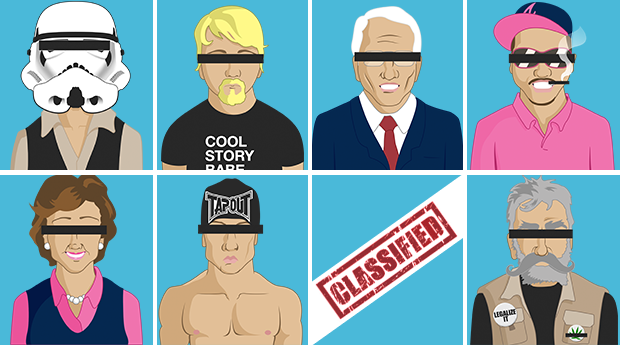Rabushka's Rules: Pinterest Etiquette

Last week, I had to dig up an old deck we’d created in 2011 to pitch Pinterest to our team internally. I’m sure you all know the drill – a new social platform appears and at first you don’t trust it… convinced it’ll die in a matter of weeks. Then, given it lasts past the 6-month honeymoon period, the distrust turns into simple skepticism. More time passes, and the stats and growing popularity give you no choice but to accept the channel as legit and consider it for your business. The deck reflected the skepticism period for Pinterest at Nebo. At the time, a platform made up of mostly visuals was a tough sell for anyone besides B2C brands that wanted to grab the attention of users with pretty pictures of products, etc.
But, as we all know, Pinterest would go on to prove us wrong. Its popularity grew at an exponential rate - since 2012, Pinterest users have increased by 145 percent. According to Nielson’s 2012 Social Media Report, Pinterest shows the most growth of all social platforms year-over-year at +1,047 percent. So, Pinterest isn’t going anywhere. But so many companies are still having a difficult time achieving their goals there.
I believe I've discovered why and the reason relates directly to lack of attention to social etiquette: Pinterest is interest-focused, whereas most other social channels are relationship-focused.
Georgia: No Longer the Peach State?

Take a look around Georgia and you’ll see peaches everywhere. Not real peaches, mind you – streets called Peachtree, peach-inspired logos, and shops selling peach pie and peach cobbler and peach pastries.
But did you know that Georgia isn’t the leading producer of peaches anymore? It hasn’t been for decades. Since taking the fruit world by storm around the time of the Civil War, Georgia has since lost its national crown to California and even fallen behind places like South Carolina and China.
So why is Georgia still known as the Peach State? Isn’t it a bit inauthentic? Is Georgia at risk of becoming the hole in the wall diner that claims to serve the world’s best coffee? Or the flailing tech company that was cutting edge 20 years ago but hasn’t innovated since?
Maybe it’s time for a change.
Anchored by Your Inbox

I really look forward to a hot cup of coffee in the morning and listening to my favorite podcasts on the way into work. It’s not that I dread the day or anything, but those are about the only things worth pivoting myself out of bed for as far as I’m concerned. I certainly don’t get jazzed for the forty-five minutes of inch-worming my way down the highway and toward the office. I’m not particularly in love with knowing I’m a good sixteen hours away from seeing the business end of my bed again. And I could do without walking my dog through tall, dew-soaked grass and picking up after her while still slipping in and out of a dream state.
So you can imagine that when I woke up the other morning to a work email with some blunt criticism of an assignment I had turned in the previous day, it felt a little like piling on.
That email stuck in my craw as I showered and got ready for the day. I drafted a response in my head as I brewed a cup of joe. It gnawed at me as I started up the car and pulled away from my apartment. My coffee tasted worse. The podcast was white-noise. My mind was elsewhere.
About halfway to work, I realized whose fault this was. I realized who was responsible for wrecking my morning, a morning that was already going to be bad enough without that feeling of failure and doom that currently sat in my stomach.
I realized, then, that this was entirely my fault.
The Dark, Dank, Confused Mind of Facebook Commenters

Anyone who manages a company’s social media account knows that doing so opens oneself up to all manner of—shall we say—eccentric people and opinions. Social media has enabled brands to personally engage with their audience like never before, but the other side of the coin is that it provides literally anyone with a computer and a passing knowledge of the internet the same opportunity. The most niche, technical post ever is just as likely to get a response from a seasoned industry professional as it is from the guy inventing reasons to throw around racial epithets; and both get an equal voice.
Facebook seems to be the channel that draws most of the unusual commenters out of the woodwork. This could be a matter of numbers owing to the fact that there are more than twice as many active users on Facebook than there are on Twitter, or maybe the Facebook demographic just skews a little crazier.
Whatever the case, here at Nebo we’re no strangers to strange comments on Facebook. In fact, we get so many that we’ve noticed trends in the type of comments we see. Maybe you’ve noticed the same on your company’s Facebook. Maybe you’ve paid to promote a post only to have dozens of misanthropic or oddball characters click your ad and leave a stream of irrelevant comments. If this sounds like you, then get ready to click “hide comment” as we present the eight people you’ll meet on Facebook. These are all based on actual comments we’ve had on our Facebook posts, but the names, pictures and comments were changed to protect the innocent. And the guilty.
We Need Your Help To Transform Education in Atlanta

Three months ago, we were approached by Leadership Atlanta and the organizers of the (co)lab Summit with a big task: to awaken the change agents within Atlanta and inspire the region’s most talented citizens to help transform education.
To do this, we were tasked with writing briefs, helping to rally the community around education, and designing/producing two short videos that would bring to light the challenges our city is facing in regards to educating our children to life.
Retargeting and the Power of Story

I still remember the first retargeting campaign that I created. It was late 2009, and Nebo was lucky enough to be enrolled in Google’s beta remarketing program.
While the concept of retargeting wasn’t new at that point, Google opened the doors and made it easier to jump in and create retargeting campaigns that reached a large audience regardless of budget.
Those first few retargeting campaigns I created were pure magic, considering I put minimal effort into them. This was not entirely out of laziness; back then, there just wasn’t much you COULD do. Essentially, I would set up two audiences, those that came to a site and converted and those that came to a site and didn’t convert, and then had one ad for each of those audiences. Then I watched the ROI on these campaigns hit up to 10x the return of the general display campaigns.
The whole thing was too good to be true—literally. As time passed and Google opened up their platform to everyone, the performance of these campaigns started to decline. The return was still better than any general display or search campaign, but the “crazy awesome” metrics dwindled to just “pretty awesome.”